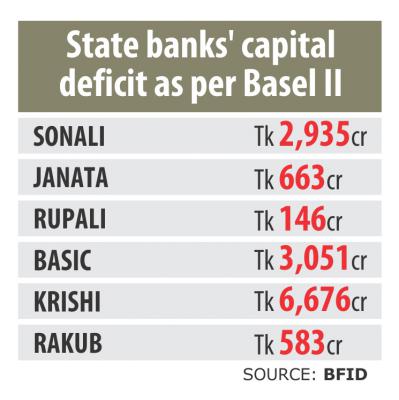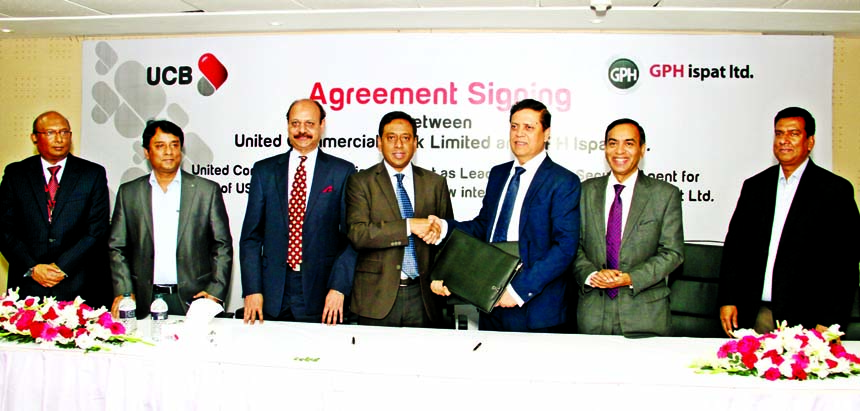
The Bank and Financial Institutions Division (BFID) has sought more than Tk 10,000 crore for the next two fiscal years mainly to meet the capital shortfall of the two scam-hit state banks.
It also wants to inject fresh capital into other banks and financial institutions.
Last week, the BFID sent a comprehensive proposal to the Finance Division saying the institutions have been facing a capital shortfall of Tk 14,054 crore.
Subsequently, it sought Tk 5,000 crore for fiscal 2016-17 and fiscal 2017-18 each.
Some Tk 5,000 crore has already been earmarked in the current year's budget, of which Tk 1,200 crore has already been disbursed to BASIC Bank. In the last two fiscal years, a total of Tk 10,000 crore was set aside for the purpose, but in the end, about Tk 6,400 crore was given to banks.
BFID Secretary M Aslam Alam said a comprehensive plan was sent to the Finance Division this time to avoid having to ask for funds over and over again.
As per Basel II, Sonali Bank has Tk 2,935 crore of capital shortfall and BASIC Tk 3,051 crore, according to BFID statistics. Krishi Bank has a shortfall of Tk 6,676 crore, which is the highest.
Due to the scams at Sonali and BASIC, a big hole has been created, Alam said. Although the two banks are now running well, the financial hole has to be plugged still.
Sonali is the largest bank in the country, and if its balance sheet remains bad the international community may lose trust in Bangladesh's banking sector altogether, he said.
The capital shortfall at Krishi Bank is not only due to corruption and inefficiency.
The government waived a portion of the bank's loans that turned into defaults since independence, and the trend continued until the mid-1990s, Alam said. This has created a long-term capital shortfall, so the government has decided to inject funds.
Alam said the government has shares in some private banks, including the Grameen Bank, so it needs to top up their capital as well.
As per the new insurance law, the government has to provide capital to Sadharan Bima Corporation and Jiban Bima Corporation as well.
On the other hand, the government has set up some new banks like Palli Sanchay Bank, where it also has to provide capital. Zahid Hossain, lead economist at the World Bank Dhaka office, said the BFID's fund demands would be a huge burden on the budget. It is understandable that large banks like Sonali are too big to be allowed to fail. They need recapitalisation in order to continue their regular operations.
However, it is important to harden their budget constraints so that they do a complete a clean-up of all bad loans by a specified date, he said.
“Unconditional recapitalisation provides no incentive to do some deep surgery to repair their damaged balance sheets.”
He said the BFID's annual performance agreement with the banks should have specific indicators on the solvency of each of the institutions seeking recapitalisation.
Disbursement from the budgetary provisions for recapitalisation should be linked to achieving the specified improvements in these indicators.
Over the longer term, rising stress in the state-owned banks will require more radical reforms in the structure of governance in them. The fundamental problem with the state banks is that they are run as state-owned enterprises: the government has improper influences on their operations, according to Hussain.
Also, many private industrial companies have been hit by delays in making their investment projects operational due to unavailability of basic utility connections such as gas, water and electricity, leaving them unable to repay their loans to state banks.
These problems have been around for a long time and are deeply rooted, he said.
Without a thorough reform of the SOEs and the way that banks are run as SOEs, the problems with the banking system will never be really solved, even after the banks are fully or partially relieved of current non-performing loans.
In response, Alam said the BFID signed performance contracts last year for the first time with banks.
Since it was the first time, the targets were softer. But this year, they will be made tougher, he said.
Furthermore, initiatives have been taken to bring reforms to state banks, he said, adding that efficient and skilled persons are being appointed in the banks' boards.
News:The Daily Star/17-Feb-2016





 Muhammed Ali; Managing Director of
Muhammed Ali; Managing Director of